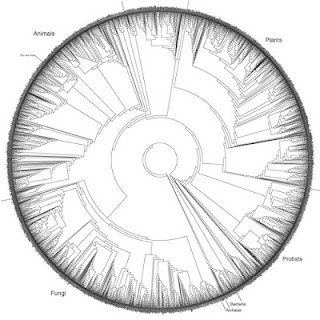We are so small.
Twitter has unveiled me to so many days in the calendar that I had no clue existed! I'm sure I'm not the only one...
Today is Endangered Species Day but, considering this event comes 3 days before exam week, I'm afraid this entry is going to be a bit brief. I only hope that other articles give you more details of this day and the honest publicity such a topic like this deserves.
I hope they make us think. Really think.
Think how closely entwined we are with the Earth; not only do we influence nature, we are a part of it. We are, in the grand scheme of things, a mere minority amongst the mass of biodiversity on this planet. A simple carbon store in it's whole entity.
Think how much inequality there is. Not just within our species but between us and all other species. We can't change our cerebral capacity, I give you that. It is just too science fiction. However, we have chosen a life of destruction. We chose to impose evident inequalities by taking habitats as our own without sharing. In doing this act of survival short term, aren't we plotting a path for our own species' destruction in the long term?
If we wreck the system of the Earth and blow it out of proportion, not only do we loose the lives of the magnificent array of species around us, but possibly even our own.
Does increasing our cerebral capacity inevitably lead to self-destruction?
In other words, smarter species accumulate all knowledge and then learn new things, how to manipulate ideas and develop. But, is it a smarter thing to stay 'dumber.' And keep in line with the Earth's balancing cycle?
I suppose we'll find out.
It's interesting. I'm not sure what to think. I'm not sure what I want to think. Is it better to do things in a cycle, simply acting as the chemicals move you, never to 'develop?' Or is 'developing' simply an ideology that refuses to acknowledge the degrading mental health of our population with more cases of crime, addiction and health problems, both physically and mentally.
This blog turned out to be not-so-brief after all.
H _ M
:)
Bibliography
http://storiented.blogspot.co.uk/2012/05/biodiversity-good-extinction-bad.html
https://www.ted.com/talks/alejandro_sanchez_alvarado_to_solve_old_problems_study_new_species#t-281958
Today is Endangered Species Day but, considering this event comes 3 days before exam week, I'm afraid this entry is going to be a bit brief. I only hope that other articles give you more details of this day and the honest publicity such a topic like this deserves.
I hope they make us think. Really think.
Think how closely entwined we are with the Earth; not only do we influence nature, we are a part of it. We are, in the grand scheme of things, a mere minority amongst the mass of biodiversity on this planet. A simple carbon store in it's whole entity.
 |
| According to http://storiented.blogspot.co.uk, Showing less than 1% of all known species, this phylogenetic tree of life was created by David Hillis, Derreck Zwickil and Robin Gutell. It displays the evolutionary relationships of about 3,000 species. Hillis et al., Science, 2003 |
Think how much inequality there is. Not just within our species but between us and all other species. We can't change our cerebral capacity, I give you that. It is just too science fiction. However, we have chosen a life of destruction. We chose to impose evident inequalities by taking habitats as our own without sharing. In doing this act of survival short term, aren't we plotting a path for our own species' destruction in the long term?
If we wreck the system of the Earth and blow it out of proportion, not only do we loose the lives of the magnificent array of species around us, but possibly even our own.
Does increasing our cerebral capacity inevitably lead to self-destruction?
 |
| Zoomed in version of the above phylogenetic tree showing our species', the homo sapiens, position. Hillis et al., Science 2003 https://www.ted.com/talks/alejandro_sanchez_alvarado_to_solve_old_problems_study_new_species#t-281958 |
I suppose we'll find out.
It's interesting. I'm not sure what to think. I'm not sure what I want to think. Is it better to do things in a cycle, simply acting as the chemicals move you, never to 'develop?' Or is 'developing' simply an ideology that refuses to acknowledge the degrading mental health of our population with more cases of crime, addiction and health problems, both physically and mentally.
This blog turned out to be not-so-brief after all.
H _ M
:)
Bibliography
http://storiented.blogspot.co.uk/2012/05/biodiversity-good-extinction-bad.html
https://www.ted.com/talks/alejandro_sanchez_alvarado_to_solve_old_problems_study_new_species#t-281958


Inequality can be acceptable as long as we don't lose respect
ReplyDeleteYes, I see that. As long as respect provides understanding and equal opportunities for humans. Then the inequality is fair. E.g if people have the chance to become CEO of a company but choose not too.
Delete